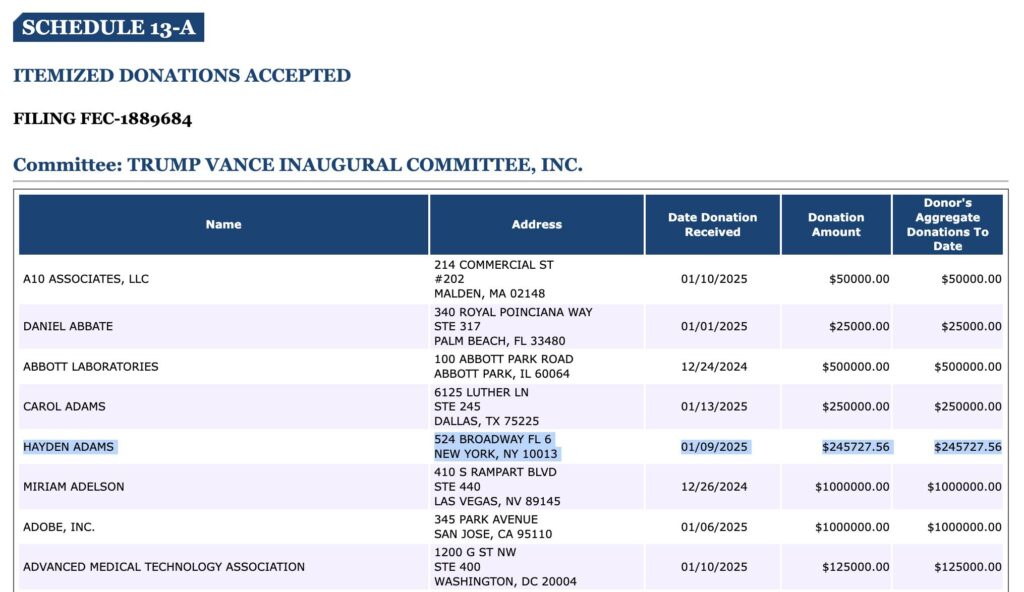New revelations from the Federal Election Commission (FEC) shed light on the substantial financial backing that cryptocurrency firms and their leaders provided to support President Donald Trump’s inauguration fund following the contentious 2024 election results. Public records from the Trump-Vance Inaugural Committee, disclosed on April 20, show that notable figures in the crypto sector made significant contributions. Uniswap’s CEO, Hayden Adams, made headlines with a contribution exceeding $245,000, while Solana Labs stepped up with a remarkable donation of $1 million. Additionally, software company Consensys contributed $100,000, underscoring a trend among major crypto players, including well-known names like Coinbase, Ripple Labs, Kraken, and Robinhood, who rallied behind the president through their financial support for the inaugural fund.
“Altogether, the fund reported over $239 million in net donations between November 15 and April 20.”
The influx of funds was not limited to the cryptocurrency industry, as the committee also welcomed donations from major corporations such as McDonald’s, Meta, and Apple, each contributing $1 million. Alongside these contributions, the SEC has made headlines for its shifting stance since Trump’s inauguration on January 20, dropping investigations and enforcement actions against various crypto firms that participated in political funding. February reports indicated that the SEC had put an end to its probe into Uniswap, with similar conclusions for other firms like Consensys and Ripple.
Amid these developments, Trump’s involvement in the cryptocurrency space raises questions about potential conflicts of interest. His recent launch of a memecoin on the Solana blockchain, coupled with plans for a stablecoin through the family-founded World Liberty Financial, has sparked discussions on regulation as lawmakers grapple with the implications of these initiatives. The cryptocurrency realm is also gearing up for the next electoral battleground, with crypto-backed political action committees (PACs) reportedly amassing over $131 million for campaign influence in critical congressional races.
“The Fairshake PAC has revealed plans to utilize over $100 million for the upcoming 2026 midterms, bolstered by contributions from industry heavyweights like Coinbase and Ripple.”
The ongoing interplay between cryptocurrency and politics raises intriguing questions about the future of regulation and the influence of money in this emerging landscape, as stakeholders and lawmakers continue to navigate the complexities of the sector.
Key Points on Cryptocurrency Contributions to Trump’s Inaugural Fund
The recent disclosures by the Federal Election Commission (FEC) reveal substantial financial backing from cryptocurrency firms to US President Donald Trump’s inauguration fund, potentially influencing both the crypto industry and political climate. Below are the key points derived from the article:
- Significant Donations from Crypto Firms
- Uniswap CEO Hayden Adams contributed over $245,000.
- Solana Labs donated $1 million.
- Consensys provided $100,000 to the inauguration fund.
- Other notable donations came from Coinbase, Ripple Labs, and Kraken.
- Total Fundraising Amount
The Trump-Vance Inaugural Committee reported over $239 million in net donations from various companies and individuals.
- Impact on SEC Investigations
Since Trump’s inauguration and the appointment of Mark Uyeda as acting chair of the SEC, several investigations against crypto firms have been dropped, which may foster a more favorable regulatory environment for these companies.
- Conflict of Interest Concerns
Trump’s launch of memecoins alongside his wife’s project raises concerns about potential conflicts of interest as he capitalizes on his political position.
- Future of Crypto Regulations
As Trump’s family launches World Liberty Financial for a dollar-pegged stablecoin, lawmakers are contemplating new legislation to regulate cryptocurrency technologies.
- Political Action Committees (PACs)
In the 2024 election cycle, crypto-backed PACs have spent over $131 million to influence congressional races, indicating substantial political engagement from the cryptocurrency sector.
These developments not only affect the dynamics of political funding but may also impact regulatory actions towards cryptocurrency in the US, influencing both investment opportunities and compliance requirements for individuals and firms involved in the crypto space.
Political Contributions from Crypto Firms: A Double-Edged Sword
Recent revelations from the Federal Election Commission (FEC) unveil a notable trend: a surge of financial backing from cryptocurrency firms towards the inauguration fund for former President Donald Trump. High-profile contributions from notable figures like Uniswap’s CEO, Hayden Adams, and companies such as Solana Labs and Consensys suggest a strategic alignment between the crypto sector and political power. While some may view these donations as a savvy investment in favor of pro-crypto policies, others are raising alarms about potential conflicts of interest and the implications for regulation within the industry.
Comparatively, this wave of large-scale contributions to Trump stands in contrast to the more cautious pledges seen in previous political cycles, where many crypto companies leaned toward more liberal candidates. This shift highlights a competitive advantage for crypto firms that are strategically placing their bets on a candidate who may favor deregulation amidst a growing scrutiny of the sector. However, such support also opens these firms up to reputational risks, drawing potential backlash from portions of the electorate who view political donations through a critical lens.
Furthermore, the apparent connections between financial contributions and favorable treatment from regulatory bodies, like the SEC’s decision to halt investigations into several donating firms, may set a dangerous precedent. This situation could foster distrust within the broader political landscape, leading lawmakers and voters alike to question the integrity of a system seemingly swayed by big-money donations.
This entanglement benefits crypto firms seeking a favorable regulatory environment, as seen in the SEC’s recent actions. However, it also poses a significant dilemma for those firms aiming to maintain an image of transparency and ethical governance. If regulatory favoritism becomes widely perceived, it could damage consumer trust and, by extension, investor confidence in the cryptocurrency market.
Additionally, the growing involvement of political action committees (PACs) fueled by the crypto sector, which have already budgeted over $131 million for key congressional races, underscores the strategic positioning of these entities for upcoming battles in the political arena. But this aggressive approach may leave the industry vulnerable in the eyes of Congress and other regulatory bodies, which could lead to more stringent regulations in the future if perceived as a breach of ethical conduct.
In summary, the intertwining of cryptocurrency contributions to political campaigns not only raises immediate questions about the implications for regulation and market dynamics but also sets a stage where both opportunities and risks are amplified. Stakeholders, including investors, consumers, and regulatory bodies, must navigate this complex landscape, being aware that while strategic political donations may yield short-term advantages, they are not without profound long-term challenges.

















